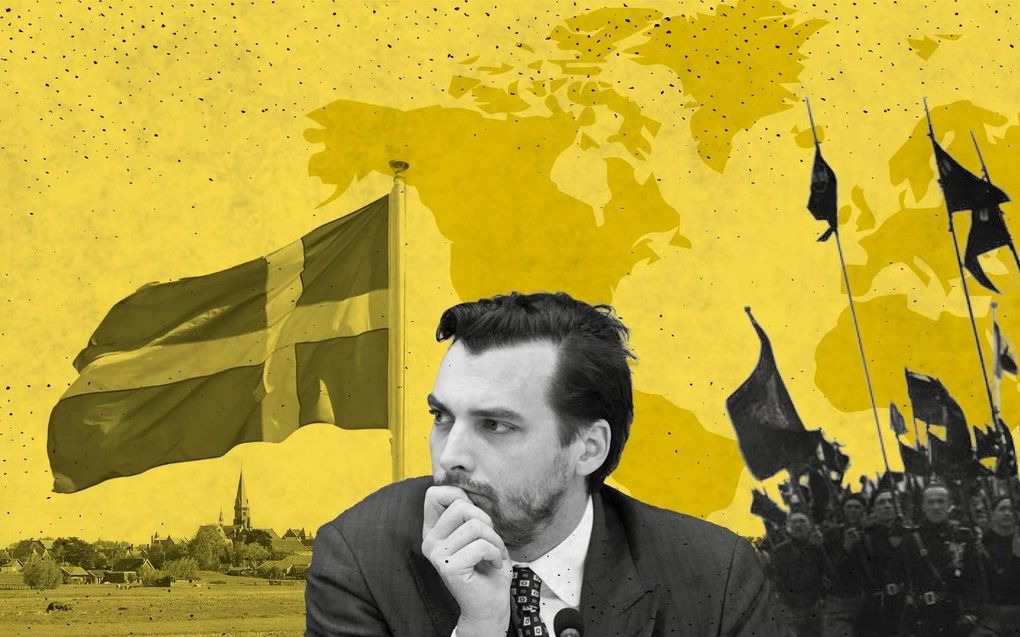Do conservatism and fascism go hand in hand?
07-10-2022
Opinion
Jakob Hoekman, RD

Thierry Baudet, the foreman of the Dutch populist party Forum for Democracy. Photo Corné van der Horst
Opinion
Sweden is quite sick of it. Gang violence and difficulties with the integration of newcomers: it should be over, period. A majority of the Swedes voted recently for a totally different political course. On the right, the Sweden Democrats became the largest party. And that is a fundamental shift because no party is more right-wing than the Sweden Democrats in the Nordic country.
Italy followed suit. There, Fratelli d'Italia, Brothers of Italy, won the elections. And that party is also on the far right side of the political spectrum. Its leader and likely the new prime minister of Italy, Giorgia Meloni, thinks it should be over with the LGBT lobby and woke ideology, among other things.
Journalist Jakob Hoekman researches history to find answers to difficult questions related to the news
And look at the Netherlands. There, it turned out that the new Transgender bill has far more opponents than previously thought. The proposal aims to remove the requirement for an expert opinion for a legal gender change and lowers the age limit for the procedure as well. The campaign against the proposal even led to an unlikely alliance between conservatives and feminists. The latter insist that women may feel unsafe if any man can legally pose as a woman. The former emphasises above all that gender is a biological fact, and that confusion about gender among young people is often temporary.
Three countries, three developments. All these trends indicate a resurgence of the conservative right of the political spectrum; that much is clear. But "conservative" and "right-wing" are only two labels you can put on them. Rather, some advocates speak of the triumph of common sense. On the other hand, opponents are quick to stick to another highly controversial label: fascism. Or, as the dictionary says: an ideology of authoritarian exercise of authority and rejection of democracy.
And naturally, the accusation of fascism sounded plenty in recent days. The Sweden Democrats? They have a fascist past. Fratelli d'Italia? The same.
And criticism of transgenderism has always been strongly linked to fascism. The accusations are to neutralise any right-wing revival in advance because we haven't done business with fascists since World War II.
Reasonable debate
But is this recurrent accusation justified? Interestingly, common sense and fascism have some similarities, at least according to the ten pillars of fascism laid out by American philosopher Jason Stanley. One of those pillars is the emphasis on "our" glorious past being threatened by "the other". Or that "we" defend family values while "they" are deviant and threatening.
Anyone who stops here is almost bound to conclude that those who criticise conservatism have a brown smell to them. But wait a minute. A couple of other pillars of fascism are precisely at odds with 'common sense'. Fascists, Jason Stanley says, are almost always anti-intellectual. Expertise has no value to them. Neither do facts. Reasonable debate is impossible with them because they do not recognise basic facts.
Somewhere here, a party like the Dutch Forum for Democracy has taken a wrong turn, experts argue. The conspiracy theories, the embrace of myths: an average right-wing conservative will not recognise himself in this. Instead, they are looking for reasonableness, for ordinary human judgements based on the realities of life. An example is not allowing young people under 18 to change their legal sex because they cannot yet foresee the consequences of such an action.
Such an approach may not always be rational because somehow it is quite rational to take the principle of equal treatment so far that young transgender people can also easily change a letter in a passport.
Yet such an approach is reasonable, British philosopher Stephen Toulmin shows in his book "Return to Reason". He pleads for confronting the uncertain and unpredictable world we live in not with rigid ideologies from the left or right but rather with a more human form of reasonableness - reasonableness based not on abstract theories but on the human experience.
In this, he is not the first. The real champion of common sense is G. K. Chesterton, the conservative British author who died in 1936 and masterfully campaigned for a worldview based on what we see happening daily. Especially in his still readable 1908 book "Orthodoxy", he shows strong examples of this.
Fires
It was the same Chesterton who knew that sooner or later, that approach to common sense would be attacked. "Fires will be lit to testify that two and two are four. Swords will be drawn to prove that leaves are green in summer."
That is precisely the quote Giorgia Meloni used in her victory speech in Italy this week, an address that was appreciated by many beyond her immediate supporters for its practical, down-to-earth approach.
The main question is how her party will develop this line of thought. Will it remain as mainstream Christian as it is now, or does its fascist past beckon?
In any case, based on Jason Stanley's ten pillars, it is fair to point out that there is a transition between (Christian) conservatism and far-right ideology. And that the line between the two is perhaps more blurred than many would like to believe to be true. After all, there are shared values between the two. But that obviously does not make A the same as B. In fact, the observation that things went wrong in Italy in the past can be an extra incentive to stay on the right side of the line this time.
This article was translated by CNE.news and published in the Dutch daily Reformatorisch Dagblad on October 1
Related Articles






